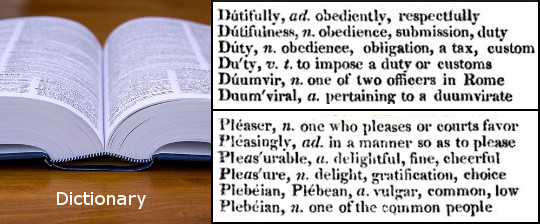Harold L. Spence? Anonymous?

Question for Quote Investigator: You examined an adage about success and work that cleverly referred to their alphabetical order. I’ve seen a different joke about duty and pleasure:
Duty comes before pleasure, but only in the dictionary.
Would you please explore this saying?
Reply from Quote Investigator: The earliest instance of this type of remark known to QI was printed in several newspapers in 1912. For example, “The Iola Register” of Kansas published a set of “Quaker Meditations” with an acknowledgement to “The Philadelphia Record” which included the following three statements. Boldface has been added to excerpts:1
The world is always eager to give a man a boost when he gets close to the top.
The one place where duty always comes before pleasure is in the dictionary.
Few things are perfect. Even the longest way ’round has its shortcomings.
The above remark was an anti-proverb that slyly subverted the preexisting didactic sayings: “Duty before pleasure” and “Business before pleasure”. The initial instances were anonymous. Top language columnist Ben Zimmer who writes for “The Wall Street Journal” identified this early version of the anti-proverb and shared it with QI.
Here are additional selected citations in chronological order.
“The Wall Street Journal” printed the saying in its “Pepper and Salt” humor section the day after it appeared in “The Iola Register”. The “Journal” acknowledged “The Boston Globe” and provided no attribution.2
In January 1913 “The New York Times” printed the same remark together with twenty miscellaneous sayings under the title “Greenwood Lake Philosophy”. The three sayings listed above from “The Iola Register” were included.3
In April 1913 “The Sunday News Tribune” of Duluth, Minnesota printed an instance with a slightly different phrasing:4
There’s only one place where duty always comes before pleasure—and that’s in the dictionary.
In September 1913 the “Salisbury Evening Post” of Salisbury, North Carolina published the following instance:5
Duty comes before pleasure. If you don’t believe it, look in the dictionary.
In 1915 “The Cincinnati Enquirer” in Cincinnati, Ohio presented this variant:6
The Wise Fool.
“Duty comes before pleasure,” observed the Sage.
“Yes, in the dictionary,” replied the Fool.
In 1921 “The Brandon Daily Sun” of Manitoba, Canada added a prefatory phrase to the remark:7
We don’t like to jazz the moralists but about the only place duty comes before pleasure is in the dictionary.
In 1922 “The Rockford Republic” of Rockford, Illinois offered this version:8
Principal place where duty is now found before pleasure is in the dictionary.
In 1935 a different pair of words, “success” and “work”, was employed in a dictionary-based quip. A separate entry on this saying has been posted here. The 1935 expression was published in the “Bluefield Daily Telegraph” of Bluefield, West Virginia in a column called “The Press Box” by Stubby Currence who covered sports for the paper:9
BUFF SAYS: “The dictionary is the only place where you come to SUCCESS before you get to WORK.”
In 1945 the “Morning World-Herald” of Omaha, Nebraska presented the duty-pleasure remark together with an ascription. The linkage of the saying to any author was uncommon in the instances seen by QI:10
Duty comes before pleasure, but only in the dictionary, observes Harold L. Spence, Holdredge Citizen
In conclusion, the saying was in circulation by 1912, and its originator was anonymous.
Image Notes: Open book from PublicDomainPictures at Pixabay. Excerpts from the 1817 edition of “A Dictionary of the English Language: Compiled for the Use of Common Schools in the United States” by Noah Webster published by George Goodwin.
Acknowledgement: Thanks to Ben Zimmer for a valuable discussion about sayings referring to the lexicographical ordering of word pairs such as duty-pleasure, success-work, and divorce-marriage.
Update History: On January 18, 2025 the format of the bibliographical notes was updated.
- 1912 July 29, The Iola Register, Quaker Meditations (From the Philadelphia Record), Quote Page 4, Column 3, Iola, Kansas. (Newspapers_com) ↩︎
- 1912 July 30, The Wall Street Journal, Pepper and Salt, Quote Page 2, Column 3, New York. (Newspapers_com) ↩︎
- 1913 January 5, The New York Times, Greenwood Lake Philosophy, Quote Page SM12, Column 5, New York. (ProQuest) ↩︎
- 1913 April 6, The Sunday News Tribune (Duluth News-Tribune), Section: Magazine, With the Looker On, Quote Page 6, Column 3, Duluth, Minnesota. (GenealogyBank) ↩︎
- 1913 September 6, Salisbury Evening Post, (Untitled filler item), Quote Page 2, Column 4, Salisbury, North Carolina. (Newspapers_com) ↩︎
- 1915 May 21, The Cincinnati Enquirer, Bits of Byplay by Luke McLuke, Quote Page 4, Column 7, Cincinnati, Ohio. (Newspapers_com) ↩︎
- 1921 April 4, Brandon Daily Sun, Sun Gleams, Quote Page 4, Column 3, Brandon, Manitoba. (NewspaperArchive) ↩︎
- 1922 November 8, Rockford Republic, Hit and Run, Quote Page 17, Column 2, Rockford, Illinois. (GenealogyBank) ↩︎
- 1935 February 17, Bluefield Daily Telegraph, Fodder For Sports From: The Press Box by Stubby Currence, Section 2, Quote Page 1, Column 6, Bluefield, West Virginia. (Newspapers_com) ↩︎
- 1945 April 25, Morning World-Herald (Omaha World Herald), Nebraska Scene by John Bentley, Quote Page 12, Column 2. Omaha, Nebraska. (GenealogyBank) ↩︎